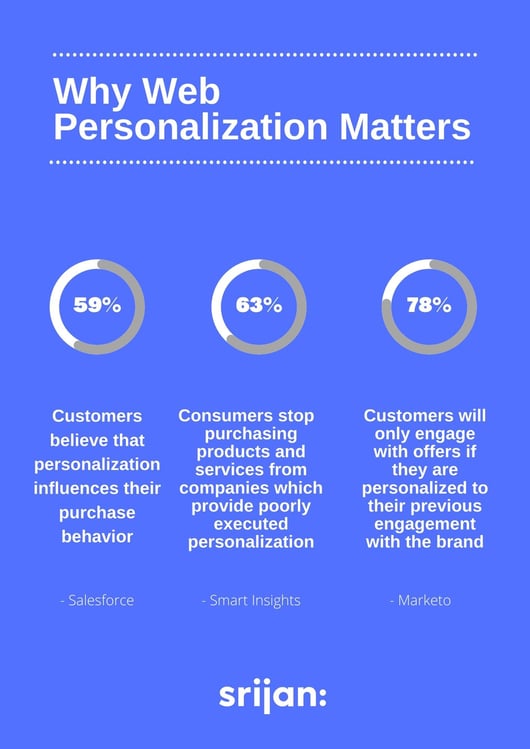Marketers often find personalization a daunting task. While marketers are always trying to create memorable and personalized experiences at each point of contact. It is hard to get reliable data, much less leverage it and create engaging omnichannel experiences.
As difficult as the task may seem, personalized customer experiences define long-term success for organizations. In fact, customers indicate that they are more than twice as likely to add an item to their cart and 40% more likely to spend more than expected, when the experience is highly personalized.
91% of consumers are more likely to shop with brands who recognize, remember, and provide them with relevant offers and recommendations.
Meeting these expectations rests with marketers, who must utilize well-defined personalization strategies, if they are to keep their consumers engaged and coming back for more.Understanding what customers want is the primary step to forming connections with them. In this blog, we cover how marketers can get started with creating the right personalized experiences.

Personalization Trends in 2021
- Integration of AI and ML: Integrating Machine Learning and Artificial Intelligence into the customer engagement process helps businesses to make intelligent decisions and experience growth acceleration. AI and ML unravel hidden insights, leading to an increase in marketing ROI. Analytics and creative problem solving make it possible to identify trigger events. This assists in personalizing interactions or making relevant suggestions.
- Digital Personalization Strategy: A sound digital personalization strategy helps to identify market segments and their unique needs and preferences. These insights help to create personalized experiences. Behavioral data leads to the creation of customer journeys.
- Win Customer Trust with Enhanced Data Privacy: Customers value their privacy and are often concerned about price discrimination, unsolicited marketing attempts, and unauthorized account access. Other concerns include third-party surveillance, and sharing of confidential information without permission. While gathering customer data is integral to a personalization strategy, a system that promises a high level of customer privacy is essential for a win-win situation.
- Mobile Experience: Mobile personalization is effective in delivering targeted messages to specific user groups. Mobile experiences involve personalized messages at different points in the customer journey, such as at the time of registration, sending push notifications, and reactivating dormant users. These timely and targeted messages pave the way for improved ROI, customer satisfaction, and retention.
- Real-Time Display: Real-time displays are intuitive tools that convey information by tracking relevant variables, including customers, performance, and so on. Such displays inform the target stakeholders to trigger their engagement or to take relevant action.
- Emphasizing Customer Loyalty: Customer loyalty is a direct implication of successful personalization. When a marketing message or action is tailored to the specific needs of the target market, the spontaneous connections that follow can retain a loyal customer base for many years.
- Product Customization Option: Current marketing capabilities in innovative companies are tuned to delivering customized products. Product customization is based on specific customer needs, evokes feelings, and builds loyalty for the brand.
How to Get Started with Personalization
Data is a central commodity that marketers use to create personalized experiences for a target market. Accurate data, when utilized as per a planned process, leads to successful personalization. The key steps involved in personalization include:
- Identification of the Target Audience: Identifying the target audience successfully is the first step to personalization. Marketers use different tools to achieve the purpose: creating user personas, identifying competitors, conducting market research, and leveraging existing data. This process helps to answer the most important questions about who the target customers are, what they do, and what exactly they want in the form of a product or service offering.
- Define Goals and Timelines: When the target market is clearly defined, marketers may set goals that they can measure and achieve and associate timelines to track progress over time. Goals can be set using any of the available techniques such as the SMART goal setting technique. Further, it is possible to use timelines through even simple digital tools that record team members, budget, and resources required for attainment of certain goals.
- Decide KPIs (Key Performance Indicators) and MOSs (Measure of Success): Every organization has a different scale to measure success. KPIs and MOSs are the tools that define success in different business domains. Marketers may have different preferences when defining them. For example, marketers may use KPIs related to processes, inputs or those that track progress, either quantitatively or qualitatively.
- Focus on Intent-Based Personalization: Intent-based personalization refers to understanding the intent or expectations of customers to achieve personalization. Understanding intent leads to contextually-relevant messages and a positive opinion about a specific brand. AI capabilities are often employed to achieve success by rapidly reaching customers through intent-based personalization.
How can Srijan Accelerate your Personalization Strategy?
Srijan Technologies is equipped with the right tools that make it possible to use data and gain ‘granular insights’ about customer preferences and behavior. Srijan technologies leverages customer data to build hyper-personalized campaigns, product and content recommendations, dynamic pricing, and omnichannel tracking.
We offer customer data platforms (CDPs) to collect and store data from multiple systems, such as ERPs, CRMs, transactional systems, and marketing automation tools. The data is further leveraged to design personalized experiences, enable predictive analytics, and unravel important insights. Marketers can devise and implement a strong analytics strategy and connect with customers on an emotional level.
Personalization is here to stay
Personalization has now become a non-negotiable element of customer experiences. Context-specific recommendations for popular customer products and services are key aspects of personalization journeys. Increased customer engagement and satisfaction is the lifeblood of any business enterprise. It saves time and effort and increases loyalty and profitability.
We understand how personalized customer experiences can lead to long-term customer retention. Our bespoke personalization and engagement solutions provide enhanced customer experiences that aim to build long-lasting relationships between your business and customers. Learn more about our personalization services or contact us.
Our Services
Customer Experience Management
- Content Management
- Marketing Automation
- Mobile Application Development
- Drupal Support and Maintanence
Enterprise Modernization, Platforms & Cloud
- Modernization Strategy
- API Management & Developer Portals
- Hybrid Cloud & Cloud Native Platforms
- Site Reliability Engineering




